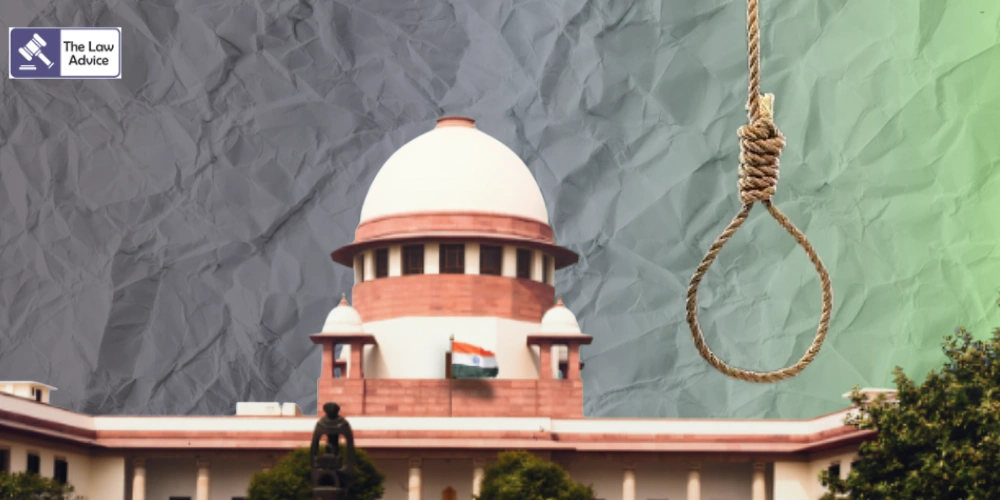The Supreme Court of India, on October 8, 2025, dismissed a modification application filed by the Union Government seeking changes to the landmark 2014 judgment in Shatrughan Chauhan v. Union of India, which laid down detailed safeguards for the rights of death row convicts.
The Bench comprising Justice Vikram Nath, Justice Sandeep Mehta, and Justice NV Anjaria found no merit in the Union’s plea, which sought to make the guidelines more “victim-centric” and to establish stricter timelines for the filing of mercy and curative petitions in capital punishment cases.
The Centre’s modification plea was originally filed in 2020, during the pendency of the death warrants for the four convicts in the 2012 Delhi gangrape and murder case (the Nirbhaya case). The plea came amid the repeated filing of petitions by the convicts that delayed their execution — which was eventually carried out in March 2020 after the Supreme Court rejected their final appeal in a rare midnight sitting.
In the 2014 Shatrughan Chauhan decision, a three-judge bench had framed comprehensive guidelines to protect the constitutional and human rights of prisoners facing death sentences. Among its major directions were:
• Delay in deciding mercy petitions can be a valid ground for commuting a death sentence to life imprisonment.
• A 14-day period must be given between the rejection of a mercy petition and the execution of the sentence. This is to allow the convict to pursue remaining remedies and to mentally prepare for the execution.
The Court had underscored that the right to life under Article 21 applies even to those sentenced to death and that humane treatment and procedural fairness are non-negotiable.
Arguing before the Court, Additional Solicitor General KM Nataraj submitted that the existing framework allowed death row convicts to indefinitely delay executions by filing mercy, review, and curative petitions at staggered intervals. This, he said, resulted in procedural abuse and caused “mental trauma to the victims and their families.”
The Centre’s application urged the Court to fix strict timelines for filing curative and mercy petitions and to shorten the 14-day notice period for executions to 7 days. It also sought a clarification that once a mercy petition is rejected, execution should not be delayed due to the pending proceedings of co-convicts.
The Union’s proposed modifications included:
1. A clear timeline for filing a curative petition after the review petition is dismissed.
2. A requirement that a mercy petition be filed within 7 days of the issuance of the death warrant.
3. A direction that execution must take place within 7 days of the rejection of the mercy petition — even if co-convicts’ petitions are pending.
The government argued that the existing guidelines under Shatrughan Chauhan fail to consider the psychological suffering of the victims’ families and undermine the deterrent effect of capital punishment by allowing inordinate delays.
After hearing the parties, the bench held that the Union’s application lacked merit and did not warrant any modification of the existing guidelines. The Court emphasized that the principles established in 2014 continue to balance the rights of convicts with procedural justice, and that due process cannot be sacrificed in the name of expediency.
Earlier, the Supreme Court had deferred consideration of the plea until the pronouncement of State of Maharashtra v. Pradeep Yashwant Kokade (2024) — a case in which the Court directed all States and Union Territories to establish dedicated cells for the prompt processing of mercy petitions in accordance with prescribed timelines. With that decision now delivered, the Court has chosen not to disturb the existing legal framework.
By dismissing the modification plea, the Supreme Court has reaffirmed that death penalty jurisprudence in India must remain anchored in constitutional morality and human rights safeguards, even in the face of public outrage or administrative inconvenience.
The ruling underscores that procedural fairness for convicts is not a sign of weakness in the justice system, but a hallmark of due process under Article 21 of the Constitution.
The case, titled Shatrughan Chauhan v. Union of India, MA 265/2020 in W.P. (Crl.) No. 55/2013, also saw the Square Circle Clinic, NALSAR University of Law, participating as an intervener, underscoring the continuing academic and policy interest in the evolving balance between victim rights and death row protections in India’s criminal justice system.
